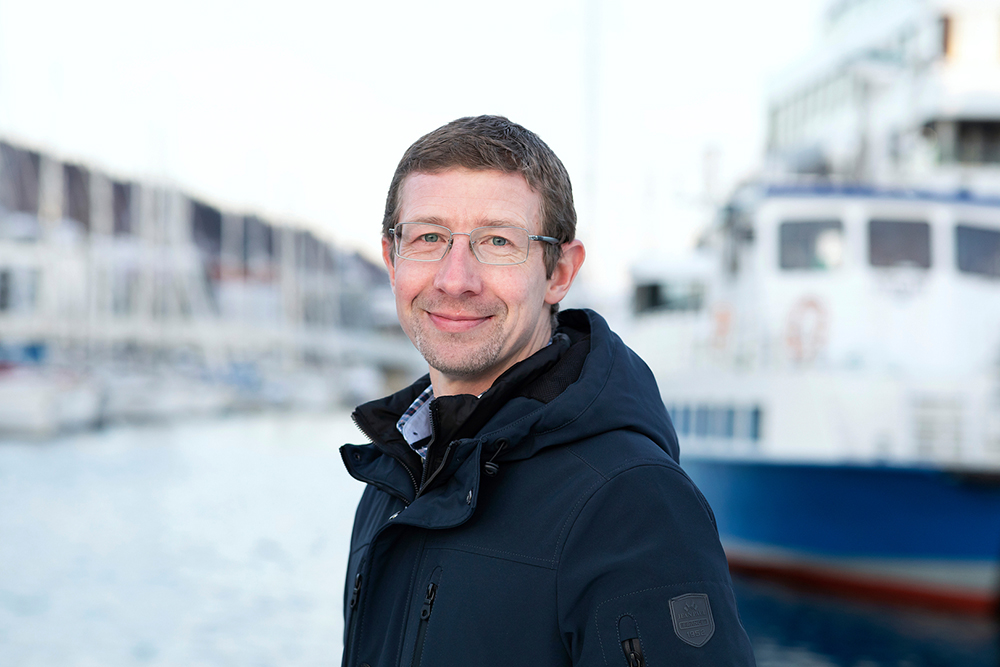
Finds the right solutions
Ted Mollan works as supplier development manager and with raw material supplier development. His job is to support and counsel Cargill’s buyers, mainly at Cargill Aqua Nutrition North Sea, but also in Chile, Canada and the rest of Cargill’s aquaculture business.
When Ted started working in the industry, selling feed was almost solely focused on price and growth (effect). Today there are more elements in the equation, not least fish health and sustainability.
Why do you put the fish first in the work you do?
“Putting the fish first is important in all contact with existing and potential feed suppliers. It’s an eternal balance between the price of feed, sustainability and fish growth and health. The most important thing is that the salmon’s carbon footprint, the end product, is as small as possible, not necessarily the feed’s carbon footprint.
Proper feed should strengthen the fish’s immune system. Among other things, Cargill conducts research concerning different raw materials’ potential impact on the fish’s intestinal health. For instance, feed with ordinary soybean meal induces enteritis in salmon while soy protein concentrate does not pose the same challenges for fish health.”
… and how do you do it, specifically?
“There are always a handful projects of great variety going on, where the point is to find the right solutions that will initially be used restrictively before being upscaled. Many aspects need to be clarified before the raw materials are brought to the factory and turned into ingredients in the EWOS feed. After potential raw materials are identified, they are tested in Dirdal.
What’s particularly important today, is to upscale ingredients like algal oil and insects. We work with protein concentrates from various vegetal sources such as soy, rapeseed and sunflowers. Yeast and bacteria can become sources for feed through fermentation, where microorganisms break down and consume organic material and create biomass rich in protein.”
What would happen if you did not prioritize fish health and fish welfare in your work?
“Without the Fish First philosophy we would risk product development focusing solely on growth and price instead of contributing to healthy fish that cope with everyday life.”
What are the benefits of prioritising fish health and welfare, and for whom?
“There is constant pressure from consumers and NGOs who are critical of farmed salmon and the feed they eat, but the criticism often stems from lack of knowledge.
Sustainability must be driven forward in collaboration between Cargill and customers, because turning more cost-efficient as well as sustainable is quite demanding. It costs, and this will be reflected in the price of feed based on the customers’ requirements.
Cargill already cooperates successfully with other parties in this field, like for instance Lerøy, who wants to utilize insects and algal oil. Cargill knows how to test, develop and create different customized feed, but we cannot subsidize the customers. Consequently, there are some extra costs, often large initially, but prices go down when production is upscaled.
Small and medium sized companies, like Hofseth and Eide, are also willing to go in for customized products. Often the issue is finding a niche market of customers who are willing to pay a bit extra.
Customers are willing to pay more for products with high documented effect on growth and health, but we must also stress that sustainability is a value in itself.”
Why should Fish First be an important focus area for the whole of Cargill?
“Fish First is particularly important when it comes to fish health. Increasingly more critical light is shed on the welfare and survival of the fish, and Cargill must supply feed that improves fish health. Again, balance is important. To the fish farmers, the number of kilos they have to kill off is what counts in the end, but then they know better than anyone else that inferior health means even more loss.”